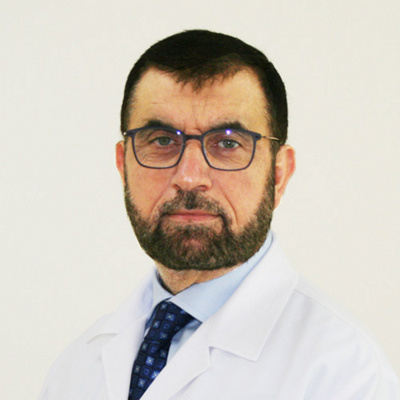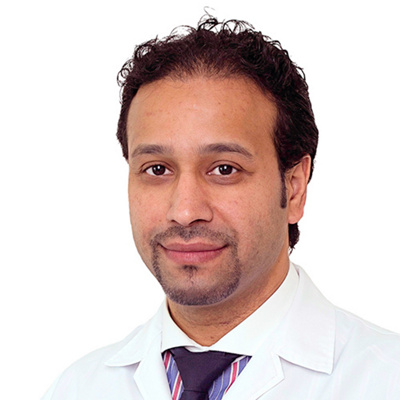At Mediclinic City Hospital, we have a team of highly qualified doctors, nurses and cardiac physiologists, which provides the full range of investigations required to diagnose all types of heart conditions. Patients with heart disease might present with symptoms such as chest pain, shortness of breath, palpitations (awareness of one’s own heartbeat), dizziness or blackouts.
Common cardiology conditions that we treat include:
- Stable angina (chest pain)
- Acute Coronary Syndromes (ACS) such as acute myocardial infarction (heart attack)
- Arrhythmia (heart rhythm problems)
- e.g. Atrial Fibrillation (AF)
- Heart failure
- Valvular heart disease
- e.g. aortic valve stenosis or rheumatic mitral valve disease
- Infective endocarditis (infection of a heart valve or heart device)
- Cardiomyopathies (heart muscles diseases)
- Pericardial disease
- Hyperlipidaemia (high cholesterol or triglycerides)
- Hypertension (high blood pressure)
Non-Invasive Diagnostic tests
Several non-invasive tests can diagnose the causes of these conditions and thereby facilitate the correct course of treatment and management. Here are some of the investigations that we offer at Mediclinic City Hospital:
- Electrocardiogram (ECG)
- Transthoracic and transoesophageal echocardiography (ECHO)
- Exercise stress testing with ECG and echocardiography
- Ambulatory cardiac monitoring (Holter monitor)
- Ambulatory blood pressure monitoring
- Tilt table testing
- Pacemaker interrogation/ programming
- Nuclear cardiology studies
- CT Coronary Angiography (CTCA)
- Cardiac Magnetic Resonance Imaging (MRI)
An electrocardiogram (ECG) records the electrical activity of the heart. It is the basic test to assess a patient’s resting heart rhythm, as well as to look for initial evidence of a new or old heart attack.
Echocardiography uses ultrasound technology to obtain images of the heart. It is an excellent tool to look at the structure and function of the heart, and in particular, to assess the pumping function of the cardiac muscle and the integrity of the heart valves.
Occasionally, in order to obtain closer images of the heart, we will pass the ultrasound probe down the oesophagus (food pipe), whilst the patient is under sedation. This is called a transoesophageal echocardiogram and can be particularly useful to assess the mitral valve and look for masses in the heart.
An exercise stress test investigates the possibility of coronary artery disease as the cause of a patient’s symptoms. During the test the patient will walk/run on a treadmill (or exercise on a bike) while continuous ECG monitoring will determine if the heart muscle is coming under strain due to a lack of blood supply. We can also perform an ultrasound scan of the heart, before and after exercise in order to assess the effects of exercise on the heart muscle function. These data can help us to identify the likelihood of significant coronary artery disease. In patients who cannot exercise, we can intravenously administer a drug called Dobutamine, which can chemically stress the heart in a safe and controlled manner.
Ambulatory cardiac monitoring (Holter monitor)
Ambulatory Cardiac monitoring (Holter monitor) assesses a patient’s heart rhythm over 24-72 hours. This portable device can identify heart rhythm disorders, which can account for symptoms such as palpitations, dizziness and blackouts.
For patients who already have an implantable device such as a permanent pacemaker, we can also monitor the heart rhythm remotely, by receiving data directly from the device to applications in the doctor’s office
Ambulatory blood pressure monitor
Hypertension (high blood pressure) is a major risk factor for heart attacks and strokes, and therefore, it is important to diagnose this condition accurately and to evaluate the effectiveness of treatments. By applying a blood pressure cuff connected to a small box, we can record a patient’s blood pressure every 20-30 minutes over a 24-hour period and thereby obtain a reliable assessment of blood pressure control.
During a tilt table study a patient lies on a table, which moves between the horizontal and vertical planes, while blood pressure and heart rate measurements are recorded at regular intervals. This test investigates symptoms such as dizziness and blackouts, which are often caused by postural changes in blood pressure and/ or inappropriate slowing of the heart rate.
Pacemaker interrogation/ programming
We have dedicated doctors and cardiac physiologists who are experts in pacemaker interrogation and programming. All permanent pacemakers require a regular check-up to assess the battery life and safe and appropriate function of the pacemaker.
Nuclear cardiology uses non-invasive techniques to assess the blood flow to the heart muscle, evaluate the pumping function of the heart as well as visualize the size and location of a heart attack. A radioactive substance, called a tracer, is injected in to the blood via a vein and travels to the heart. Images of the heart are then acquired using a gamma camera.
CT Coronary Angiography (CTCA)
Computed Tomography (CT) Coronary Angiography (CA) is a non-invasive radiological imaging tool that can visualise the coronary arteries, which are the blood vessels that supply blood to the heart. This test investigates patients complaining of chest pain and looks to see if there are cholesterol deposits causing blockages in the coronary arteries.
Cardiac Magnetic Resonance Imaging (MRI)
Cardiac Magnetic Resonance Imaging (MRI) enables acquisition of very detailed images of the heart. This is the most accurate imaging modality to assess heart muscle structure and function. It can also assess heart valve function and the dimensions of the aorta. With the use of a contrast agent, injected intravenously, Cardiac MRI is also the most accurate means of assessing the extent of infarcted heart muscle, as seen in patients who have suffered a previous heart attack.








